Filter by
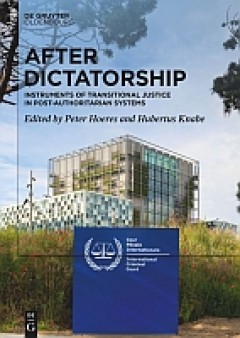
After Dictatorship : Instruments of Transitional Justice in Post-Authoritaria…
What must be done after the end of a dictatorship so that the suffering of those persecuted comes to an end and history does not repeat itself? Only rarely have long-term studies academically investigated the effects that measures implemented within the context of transitional justice have actually achieved. Taking seven countries as examples, this volume analyses what coming to terms with dict…
- Edition
- -
- ISBN/ISSN
- 9783110796704
- Collation
- 560
- Series Title
- Instruments of Transitional Justice in Post-Authoritarian Systems
- Call Number
- -

UN Security Council Referrals to the International Criminal Court : Legal Nat…
This book offers a unique critical analysis of the legal nature, effects and limits of UN Security Council referrals to the International Criminal Court (ICC). Alexandre Skander Galand provides, for the first time, a full picture of two competing understandings of the nature of the Security Council referrals to the ICC, and their respective normative interplay with legal barriers to the exercis…
- Edition
- -
- ISBN/ISSN
- 9789004342217
- Collation
- 280 hlm; ill., lamp.,
- Series Title
- -
- Call Number
- -

National Constitutions in European and Global Governance: Democracy, Rights, …
This two-volume book, published open access, brings together leading scholars of constitutional law from twenty-nine European countries to revisit the role of national constitutions at a time when decision-making has increasingly shifted to the European and transnational level. It offers important insights into three areas. First, it explores how constitutions reflect the transfer of powers fro…
- Edition
- 1
- ISBN/ISSN
- 9789462652736
- Collation
- XXIV, 1522 hlm,: ill, lamp;
- Series Title
- -
- Call Number
- -

Do Exclusionary Rules Ensure a Fair Trial? : A Comparative Perspective on Ev…
This open access publication discusses exclusionary rules in different criminal justice systems. It is based on the findings of a research project in comparative law with a focus on the question of whether or not a fair trial can be secured through evidence exclusion. Part I explains the legal framework in which exclusionary rules function in six legal systems: Germany, Switzerland, People’s …
- Edition
- -
- ISBN/ISSN
- 978-3-030-12520-2
- Collation
- XV, 380
- Series Title
- Ius Gentium: Comparative Perspectives on Law and Justice (IUSGENT, volume 74)
- Call Number
- 320 DOE
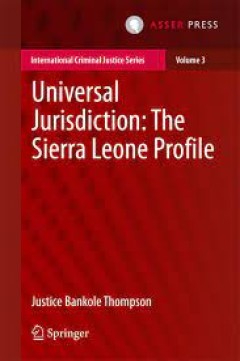
Universal Jurisdiction: The Sierra Leone Profile
The doctrine of universal jurisdiction has evolved throughout modern times in the context of global criminal justice as a paramount agent of combating impunity emanating from international criminality. Sierra Leone, as a member of the international community and the United Nations, has, in recent times, been a pioneer in the progressive application and development of international criminal law …
- Edition
- -
- ISBN/ISSN
- 978-94-6265-054-1
- Collation
- -
- Series Title
- -
- Call Number
- -
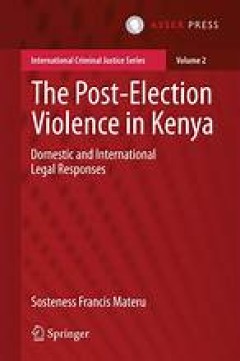
The Post-Election Violence in Kenya
Since the historic Nuremberg Trial of 1945 an international customary law principle has developed that commission of a core crime under international law – war crimes, genocide, crimes against humanity and aggression – should not go unpunished. History shows, that when in Africa such violations occurred, especially as a result of election disputes, national and regional actors, including…
- Edition
- 1
- ISBN/ISSN
- 978-94-6265-041-1
- Collation
- Hukum
- Series Title
- International Criminal Justice Series
- Call Number
- 340
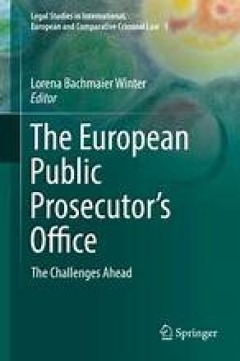
The European Public Prosecutor's Office
This book explores the European Public Prosecutor’s Office (EPPO), the creation of which was approved in the Regulation adopted by the Justice and Home Affairs (JHA) Council on 12 October 2017. The EPPO will be an independent European prosecution office tasked with investigating and prosecuting those crimes defined in the recently adopted Regulation 2017/1371 on combating fraud against th…
- Edition
- 1
- ISBN/ISSN
- 978-3-319-93916-2
- Collation
- XVIII, 279
- Series Title
- Legal Studies in International, European and Comparative Criminal Law
- Call Number
- -
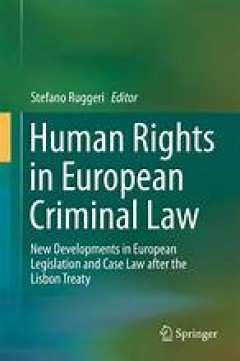
Human Rights in European Criminal Law
This book deals with human rights in European criminal law after the Lisbon Treaty. Doubtless the Lisbon Treaty has constituted a milestone in the development of European criminal justice. Not only has the reform following the Treaty given binding force to the EU Charter of Fundamental Rights, but furthermore it has paved the way for unprecedented forms of supranational legislation. In this sce…
- Edition
- 1
- ISBN/ISSN
- 978-3-319-12042-3
- Collation
- X, 317
- Series Title
- -
- Call Number
- -
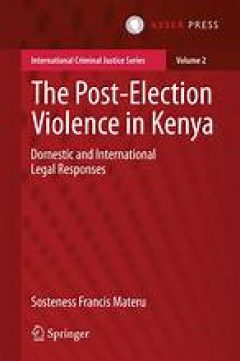
The Post-Election Violence in Kenya
Since the historic Nuremberg Trial of 1945 an international customary law principle has developed that commission of a core crime under international law – war crimes, genocide, crimes against humanity and aggression – should not go unpunished. History shows, that when in Africa such violations occurred, especially as a result of election disputes, national and regional actors, including…
- Edition
- 1
- ISBN/ISSN
- 978-94-6265-041-1
- Collation
- XVIII, 275
- Series Title
- International Criminal Justice Series
- Call Number
- -
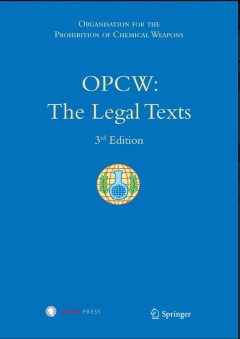
OPCW: The Legal Texts
The Convention on the Prohibition of the Development, Production, Stockpiling and Use of Chemical Weapons and on Their Destruction (CWC), which entered into force on 29 April 1997, bans an entire category of weapons of mass destruction. The CWC has now been in force for almost twenty years and having 190 States Parties as at July 2014, has almost achieved universal adherence. To achieve its obj…
- Edition
- 3
- ISBN/ISSN
- 978-94-6265-043-5
- Collation
- XXII, 783
- Series Title
- -
- Call Number
- -
 Computer Science, Information & General Works
Computer Science, Information & General Works  Philosophy & Psychology
Philosophy & Psychology  Religion
Religion  Social Sciences
Social Sciences  Language
Language  Pure Science
Pure Science  Applied Sciences
Applied Sciences  Art & Recreation
Art & Recreation  Literature
Literature  History & Geography
History & Geography